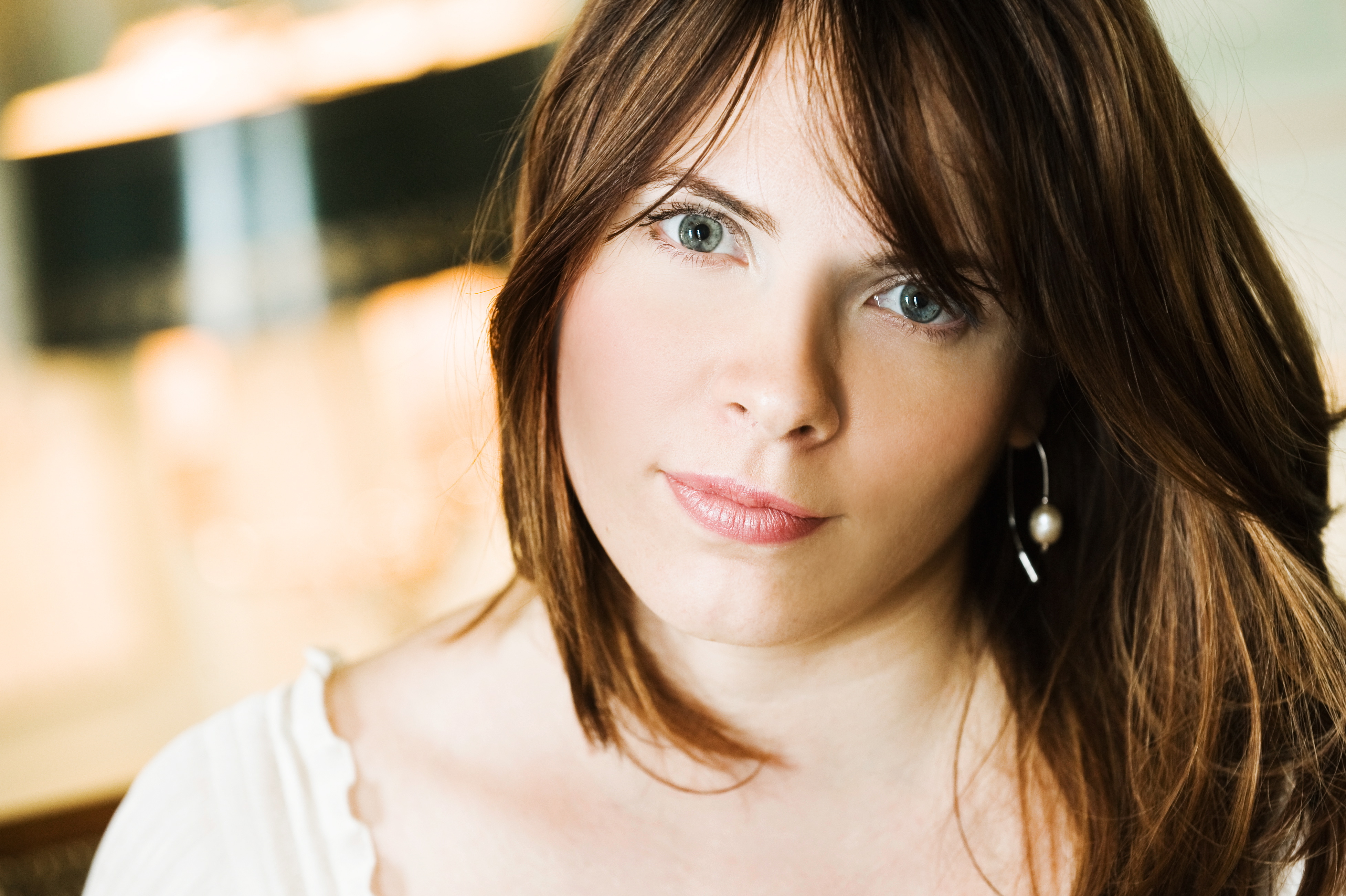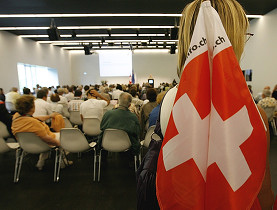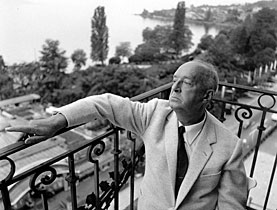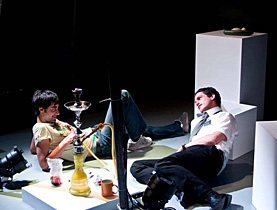Best-selling Swiss author launches English debut

Writer Zoë Jenny may only be 36, but she has already won huge critical acclaim worldwide. The Pollen Room is the all-time bestselling debut novel by a Swiss author.
This week Jenny launches her sixth novel, The Sky is Changing, which is also her first book written in English. Speaking to swissinfo.ch, the author described the book – set in London – as a documentary of the city following the 2005 terrorist attacks.
Her prose has been praised for its detailed and precise images and her style has been compared with that of Plath and Hemingway.
The Neue Zürcher Zeitung included Jenny alongside Friedrich Dürrenmatt and Max Frisch as the three most important Swiss authors read in Germany.
swissinfo.ch: What was the starting point for your English debut novel?
Zoë Jenny: I think it started with London. I think of London as a character in itself. It’s not just the backdrop to the story. I really like to describe an atmosphere – I find life endlessly inspiring and fascinating here.
There is so much to write about. It’s the richness and there are so many layers to London.
It would have been impossible to write this book in German. Maybe that’s because it’s set in London and most of the characters are English. It just wouldn’t have been right and it wouldn’t have worked in German.
swissinfo.ch: Do you feel your style of writing has changed now that you are writing in English?
Z.J.: Massively! It’s very different. Every language has its own way to see the world. It’s very different in German. I love the English language. I feel freer. My writing is freer in English.
It’s difficult to put a finger on what it is exactly. I just feel there’s no limitation, really.
Basically, my mother tongue is not German. It’s a Swiss dialect, Basel-Deutsch. So there is already a distance to German. We learned German in school. I’m not really at home in the German language and never was.
With English there’s more fluency. It’s more flexible. I wouldn’t say it’s easier. It just seems to suit my style of writing more.
swissinfo.ch: Claire, the central character in The Sky is Changing, always seems to be searching for something. It’s as though she is trying to make a clean break from her past, but she seems plagued by fear and anxiety.
Z.J.: The background to the book is really the terrorist attacks of 7/7 [the London bombings]. There’s a helicopter hovering over the house in the middle of the night. Police are everywhere. Streets are constantly being cordoned off. That’s very much how I experienced London just after those terrorist attacks. There was fear in the air and I could feel that. And it really affected me quite deeply.
And I think, whether consciously or unconsciously, it did affect a lot of people.
It’s different to waking up in a place where there were no attacks. London had quite a claustrophobic feel to me after the bombings. Everything was watched, cameras everywhere, and CCTV. You couldn’t step out of your house without being filmed.
As I said, London is an interesting place, but it has become tense in a way.
swissinfo.ch: Was it important for you to express the anxiety you felt within yourself in the novel?
Z.J.: Yes, I could project that into the characters, but especially into Claire, the main protagonist. And I guess it’s very much a part of me. The way I felt at that time. And for me it’s a portrayal of that time. Every book of mine is a documentary of the current time as I write about it. And of the place it’s set in.
Ein Schnelles Leben [A Fast Life] was set in Berlin and describes very much what was happening there at the time of writing. So every book is like a portrayal of a certain phase of my life, as well as the place it’s written in.
I feel quite lucky because I’m not defined by where I come from. I was still relatively young when I left Switzerland and became something of an urban gypsy, setting up homes in New York, Berlin, then back to Basel and now London.
swissinfo.ch: Is writing a novel also cathartic for an author?
Z.J.: I think that is the main reason for writing because you need to purify yourself. You get things out and transform thoughts, feelings and ideas into a novel. I think it’s that transformation that has a cathartic effect on me.
swissinfo.ch: Did you know from an early age you wanted to be an author?
Z.J.: I don’t know whether the fact we didn’t have a TV at home helped, but it always fascinated me to be able to enter a different world through words, and then travel the world just by reading a book.
I think it’s fantastic what literature can do to us. It’s a huge gift and I started writing stories from a very young age. It wasn’t that I decided to become a writer. I wouldn’t know what else I could do. Writing is how I enjoy spending my days.
It’s not always easy though, because writing is something you can only do on your own. Sometimes I’ve been very lonely in my life and it’s been hard. But then again it is the most beautiful thing to do. It’s amazing you can create situations and bring people to life through words. And then you’re no longer so insular and no longer alone because you actually have company with your characters and all the people you’re writing about.
Andrew Littlejohn in London, swissinfo.ch
Zoë Jenny is a Swiss novelist and scriptwriter specialising in character-based fiction.
She was born in 1974 in Basel, Switzerland and spent parts of her childhood in Greece and Ticino.
Her first novel, The Pollen Room (1997), which has been translated into 27 languages, propelled her across the globe for readings and talks in schools and universities as far away as Japan, China and the US.
Throughout her career as a writer Jenny has won a number of literary awards for her novels and short stories, including the Aspekte literature prize for best Debut in 1997 and the Swiss short story prize for Auf der Heimfahrt voted for by the public in 2002.
Her latest novel, The Sky is Changing, is her debut in English and is published by Legend Press.

In compliance with the JTI standards
More: SWI swissinfo.ch certified by the Journalism Trust Initiative




You can find an overview of ongoing debates with our journalists here. Please join us!
If you want to start a conversation about a topic raised in this article or want to report factual errors, email us at english@swissinfo.ch.